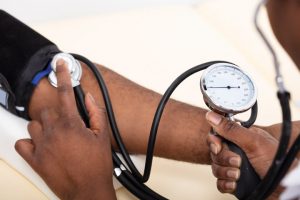Modern Men’s Health
Medical experts explain the breakthroughs in men’s health care, from science to technology and today’s societal implications.

If there is one aspect of life one can never take too seriously, it’s their health.
And if there’s one silver lining from the pandemic, it’s that a global health crisis demonstrated the importance of physical, emotional and social health, as well as promoted open conversations about medicine in all fields. Regular checkups, as well as increasingly checking up on loved ones’ health status is an expected and natural reaction to what the world has been through these past few years. And today’s ever-evolving innovations in medicine and medical technology continue to be invaluable assets in ensuring one’s optimal overall health.
Every individual is unique in their experience with their health and how their life is impacted by it, and many conditions are more common, more vital or only detectable depending on a person’s gender. The sociological climate that shifts from decade to decade determines the way men might be subject to stigma that can affect their well-being—though medical professionals’ ongoing efforts to combat unfounded biases and assumptions often lead male patients to seek the medical benefits of life-saving scientific breakthroughs, many of which are available right in their own backyard, thanks to Central Florida being home to a number of compassionate and capable care providers.
Society and Medicine
It can be difficult to recall a time before telemedicine, robotic surgeries and artificial intelligence as cutting-edge medical technology has become the expected standard. As innovations continue, so does societal understanding.
For example, in the ‘80s and ‘90s, the AIDS crisis was not adequately prioritized due to the perception that it only affected homosexual men, leading to dangerous misconceptions that any contact from a sneeze to a handshake with an HIV-positive person would transmit the virus. This only served to worsen the misinformation and the social climate for those already physically suffering and emotionally vulnerable.
HIV-positive individuals today, however, can live long lives with the pharmaceuticals available, and it is proven that the virus does not only affect men and the LGBTQIA+ community. Although it was considered deadly less than 30 years ago, the climate had to shift for medical truth to eclipse the stigma of AIDS.
Mental Health
Unfortunately, men are still harmed by baseless biases in certain aspects of their health. Though COVID signaled a noticeable shift, it often eroded mental wellness when combined with preconceived and often false gender stereotypes that prevent men from seeking the help they need.
“Men still often experience untreated mental health problems, even with significant progress made in the last few decades in raising men’s awareness of mental health issues. A National Institutes of Health study on men’s willingness to seek help for mental health issues revealed a startling truth: Men are much less likely than women to seek help,” explains Dr. Bhaskar Raju, the owner, CEO and medical director of OPA Behavioral Health. “Men committed suicide at a rate four times higher than women in 2020, according to CDC data on suicide. Males frequently self-treat through addictive behaviors like substance abuse because of stigma, social expectations, and masculinity stereotypes.”
The complexity of the human body has inspired curiosity for centuries: From the modern understanding of its processes, professionals know that mental and physical health can affect each other. Dr. Raju stresses the importance of raising awareness of men’s mental well-being at “all societal levels.”
“Men who choose not to get help for mental health problems may suffer from detrimental physical effects. It can lead to heart disease, high blood pressure and other chronic illnesses. Neglecting men’s mental health can also have a negative effect on relationships, which can make mental illness worse,” he says.
Furthermore, one part of the body that experiences a condition may be related to a different ailment elsewhere. That’s why it’s especially important to pay attention to physical signals, and to consider the whole body in relation to one potential symptom.
“There’s a condition that I tend to see more commonly in men nowadays, which is called central serous retinopathy, which is actually very common when people are going through stressful situations,” says Dr. Luis G. León-Alvarado of Florida Retina Institute. “I see it more commonly in patients with what we call ‘Type A’ personality, which is that go-getter, perfectionist. This is when I tell patients: ‘Take it down, just relax a little bit. It actually might help your eyes as well.’ I see it so often in my office with different men.”
Physical Health
Dr. Chirag Panchal, family physician at Orlando Health Physician Associates – Longwood, emphasizes that there are several trends in men’s health screening recommendations. This list includes cardiovascular health, prostate health, mental health, testicular health, skin health, sexual health, bone health and weight management.
“These are general guidelines, and individual recommendations may vary based on personal and family medical history, lifestyle factors and other considerations. It’s essential for men to have open discussions with their health care providers to determine the most appropriate screening schedule for their specific needs,” he affirms.
Dr. Panchal also provides a breakdown for different age groups in terms of recommended screenings for different healthcare conditions. Men in their 20s-30s, for example, should have regular blood pressure and cholesterol checks, especially if there are genetic or lifestyle risk factors to consider, like smoking or obesity.
“Men tend to delay seeking treatment of health issues, but starting at age 18 and throughout life men can benefit from primary care assessment at least once a year,” adds Alex Ziesemer, a nurse practitioner at AdventHealth’s Primary Care+ location in Sanford. “Primary care providers can check for a variety of potential issues: sexually transmitted infections at any age, it’s not just in young people; prostate cancer screening starting at age 50; and colorectal cancer at age 45, which involves a colonoscopy. … In primary care settings, we screen for all sorts of diseases, so don’t forget your annual appointment.”
Colorectal cancer and diabetes screenings are recommended around age 40; at age 50 and older, bone density screenings and regular vision and hearing screenings are important. Men over 65 also may require a one-time abdominal aortic aneurysm screening if they have ever smoked. Dr. Panchal points out that regardless of age, men should undergo regular checks for sexually transmitted infections (STIs), mental health and skin cancer.
“Regular skin self-examinations and dermatological evaluations are important for early detection of skin cancer at any age, especially for those with a history of sun exposure,” Dr. Panchal says. “Florida’s sunny climate and outdoor lifestyle contribute to higher rates of skin cancer, including melanoma, basal cell carcinoma and squamous cell carcinoma. Men are more likely to develop melanoma on the back.”
Medical professionals have noticed concerns that are more frequent in Florida due to its climate, particularly the heat, humidity and bodies of water. Heat exhaustion and heat stroke can affect men participating in physical labor outdoors, and the outdoors also expose Floridians to disease-carrying mosquitoes. Experts have also seen a heightened number of water-related injuries and deaths. Skin cancer, however, is a risk that individuals can and should check for regularly.
“Florida is The Sunshine State; therefore, we are more concerned about skin cancer. I recommend all my patients get screened at least annually either by their primary care provider or a dermatologist,” says Ziesemer. “In addition, we have high levels of humidity and about every possible allergen known in this state, so respiratory illnesses are more common here than in most states.”
Quality of Life
Allergens—though more of a nuisance than a concern—have become all too familiar for medical professionals and patients alike. With the potential to appear as the flu—or worse, COVID—one should seek treatment for anything that is bothering them or disrupting their life, regardless of vitality.
“Seasonal allergies are all the rage right now. I will tell patients to make sure that they keep their eyes lubricated with artificial tears that can be bought over the counter. For more complex allergies and itching and red eyes, now we are lucky enough that there are several medications that are allergy-specific medications that are over the counter,” says Dr. León-Alvarado
Medical professionals and researchers in all areas of medicine are unified in their belief that men should take care of themselves mentally and physically, while educating themselves as well. In such an exciting era of medical breakthroughs, there is much to look forward to in experts helping people live better and longer.
Focus on Men’s Health
Local providers who make patients a priority
AdventHealth — Central Florida Division
Multiple locations
(407) 303-5600
AdventHealth.com/Hospital/AdventHealth-Orlando
Florida Retina Institute
Multiple locations
(877) 357-3846
FloridaRetinaInstitute.com
Opa Behavioral Health
Multiple locations
(407) 851-5121
OPABH.com
OrlandoHealth
Multiple locations
(407) 767-5853
OrlandoHealth.com












